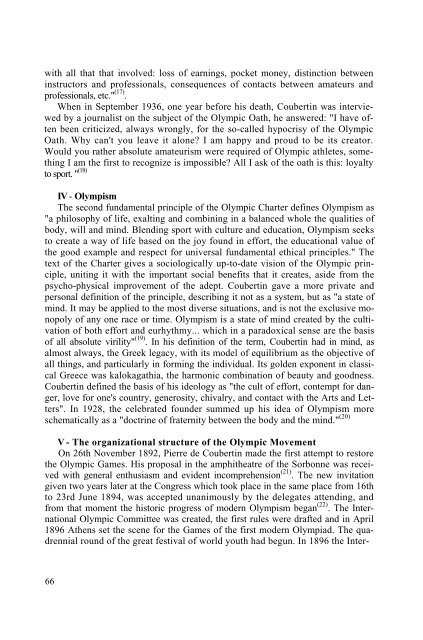You also want an ePaper? Increase the reach of your titles
YUMPU automatically turns print PDFs into web optimized ePapers that Google loves.
with all that that involved: loss of earnings, pocket money, distinction between<br />
instructors and professionals, consequences of contacts between amateurs and<br />
professionals, etc." (17) .<br />
When in September 1936, one year before his death, Coubertin was interviewed<br />
by a journalist on the subject of the Olympic Oath, he answered: "I have often<br />
been criticized, always wrongly, for the so-called hypocrisy of the Olympic<br />
Oath. Why can't you leave it alone? I am happy and proud to be its creator.<br />
Would you rather absolute amateurism were required of Olympic athletes, something<br />
I am the first to recognize is impossible? All I ask of the oath is this: loyalty<br />
to sport. " (18)<br />
IV - Olympism<br />
The second fundamental principle of the Olympic Charter defines Olympism as<br />
"a philosophy of life, exalting and combining in a balanced whole the qualities of<br />
body, will and mind. Blending sport with culture and education, Olympism seeks<br />
to create a way of life based on the joy found in effort, the educational value of<br />
the good example and respect for universal fundamental ethical principles." The<br />
text of the Charter gives a sociologically up-to-date vision of the Olympic principle,<br />
uniting it with the important social benefits that it creates, aside from the<br />
psycho-physical improvement of the adept. Coubertin gave a more private and<br />
personal definition of the principle, describing it not as a system, but as "a state of<br />
mind. It may be applied to the most diverse situations, and is not the exclusive monopoly<br />
of any one race or time. Olympism is a state of mind created by the cultivation<br />
of both effort and eurhythmy... which in a paradoxical sense are the basis<br />
of all absolute virility" (19) . In his definition of the term, Coubertin had in mind, as<br />
almost always, the Greek legacy, with its model of equilibrium as the objective of<br />
all things, and particularly in forming the individual. Its golden exponent in classical<br />
Greece was kalokagathia, the harmonic combination of beauty and goodness.<br />
Coubertin defined the basis of his ideology as "the cult of effort, contempt for danger,<br />
love for one's country, generosity, chivalry, and contact with the Arts and Letters".<br />
In 1928, the celebrated founder summed up his idea of Olympism more<br />
schematically as a "doctrine of fraternity between the body and the mind." (20)<br />
V - The organizational structure of the Olympic Movement<br />
On 26th November 1892, Pierre de Coubertin made the first attempt to restore<br />
the Olympic Games. His proposal in the amphitheatre of the Sorbonne was received<br />
with general enthusiasm and evident incomprehension (21) . The new invitation<br />
given two years later at the Congress which took place in the same place from 16th<br />
to 23rd June 1894, was accepted unanimously by the delegates attending, and<br />
from that moment the historic progress of modern Olympism began (22) . The International<br />
Olympic Committee was created, the first rules were drafted and in April<br />
1896 Athens set the scene for the Games of the first modern Olympiad. The quadrennial<br />
round of the great festival of world youth had begun. In 1896 the Inter-<br />
66

















